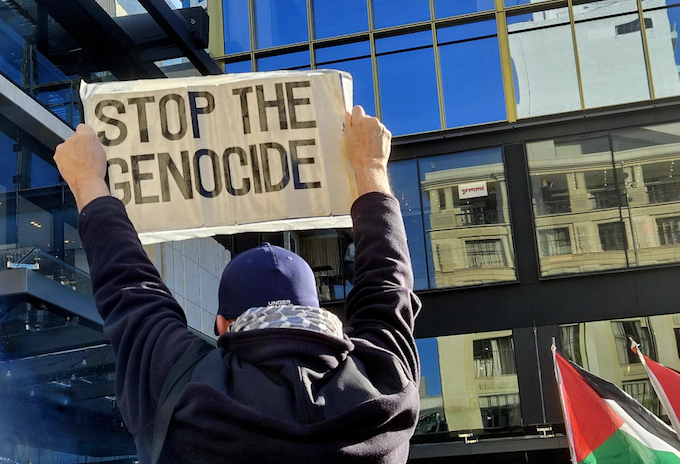COMMENTARY: By John Hobbs
It is difficult to understand what sits behind the New Zealand government’s unwillingness to sanction, or threaten to sanction, the Israeli government for its genocide against the Palestinian people.
The United Nations, human rights groups, legal experts and now genocide experts have all agreed it really is “genocide” which is being committed by the state of Israel against the civilian population of Gaza.
It is hard to argue with the conclusion genocide is happening, given the tragic images being portrayed across social and increasingly mainstream media.

Prime Minister Netanyahu has presented Israel’s assault on Gaza war as pitting “the sons of light” against “the sons of darkness”. And promised the victory of Judeo-Christian civilisation against barbarism.
A real encouragement to his military there should be no-holds barred in exercising indiscriminate destruction over the people of Gaza.
Given this background, one wonders what the nature of the advice being provided by New Zealand’s Ministry of Foreign Affairs and Trade to the minister entails?
Does the ministry fail to see the destruction and brutal killing of a huge proportion of the civilian people of Gaza? And if they see it, are they saying as much to the minister?
Cloak of ‘diplomatic language’
Or is the advice so nuanced in the cloak of “diplomatic language” it effectively says nothing and is crafted in a way which gives the minister ultimate freedom to make his own political choices.
The advice of the officials becomes a reflection of what the minister is looking for — namely, a foreign policy approach that gives him enough freedom to support the Israeli government and at the same time be in step with its closest ally, the United States.
The problem is there is no transparency around the decision-making process, so it is impossible to tell how decisions are being made.
I placed an Official Information Act request with the Minister of Foreign Affairs in January 2024 seeking advice received by the minister on New Zealand’s obligations under the Genocide Convention.
The request was refused because while the advice did exist, it fell outside the timeline indicated by my request.
It was emphasised if I were to put in a further request for the advice, it was unlikely to be released.
They then advised releasing the information would be likely to prejudice the security or defence of New Zealand and the international relations of the government of New Zealand, and withholding it was necessary to maintain legal professional privilege.
Public interest vital
It is hard to imagine how the release of such information might prejudice the security or defence of New Zealand or that the legal issues could override the public interest.
It could not be more important for New Zealanders to understand the basis for New Zealand’s foreign policy choices.
New Zealand is a contracting party to the Convention on the Prevention and Punishment of the Crime of Genocide. Under the convention, “genocide, whether committed in time of peace or in time of war, is a crime under international law which they [the contracting parties] undertake to prevent and punish”.
Furthermore: The Contracting Parties undertake to enact, in accordance with their respective Constitutions, the necessary legislation to give effect to the provisions of the present Convention, and, in particular, to provide effective penalties for persons guilty of genocide. (Article 5).
Accordingly, New Zealand must play an active part in its prevention and put in place effective penalties. Chlöe Swarbrick’s private member’s Bill to impose sanctions is one mechanism to do this.
In response to its two-month blockade of food, water and medical supplies to Gaza, and international pressure, Israel has agreed to allow a trickle of food to enter Gaza.
However, this is only a tiny fraction of what is needed to avert famine. Understandably, Israel’s response has been criticised by most of the international community, including New Zealand.
Carefully worded statement
In a carefully worded statement, signed by a collective of European countries, together with New Zealand and Australia, it is requested that Israel allow a full resumption of aid into Gaza, an immediate return to ceasefire and a return of the hostages.
Radio New Zealand interviewed the Foreign Minister Winston Peters to better understand the New Zealand position.
Peters reiterated his previous statements, expressing Israel’s actions of withholding food as “intolerable” but when asked about putting in place concrete sanctions he stated any such action was a “long, long way off”, without explaining why.
New Zealand must be clear about its foreign policy position, not hide behind diplomatic and insincere rhetoric and exercise courage by sanctioning Israel as it has done with Russia over its invasion of Ukraine.
As a minimum, it must honour its responsibilities under the Convention on Genocide and, not least, to offer hope and support for the utterly powerless and vulnerable Palestinian people before it is too late.
John Hobbs is a doctoral candidate at the National Centre for Peace and Conflict Studies (NCPACS) at the University of Otago. This article was first published by the Otago Daily Times and is republished with the author’s permission.

